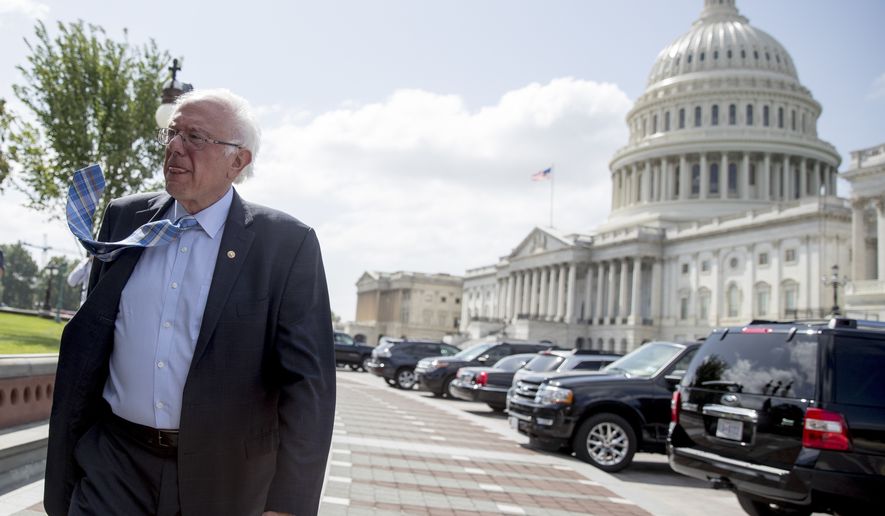Sen. Bernard Sanders called the war on terrorism “a disaster,” blasted the U.S. military-industrial complex and stepped up criticism of President Trump, saying he is too belligerent toward Iran and North Korea while not harsh enough on Russia.
Delivering the kind of foreign policy speech his supporters begged to see during his presidential campaign last year, Mr. Sanders said diplomacy starts by fighting racism at home and curtailing military adventurism abroad, where he said a string of bad decisions under both Democrats and Republicans have sapped America’s moral authority.
Speaking at Westminster College in Missouri, the Vermont independent called for curtailing military spending in favor of more policies like the Marshall Plan, which used American taxpayers’ money to help rebuild Europe after the devastation of World War II.
He questioned America’s ties to Saudi Arabia and likened U.S. support for the Saudi intervention in Yemen to Russia’s backing of the murderous regime in Syria. He also demanded a rethink of the global war on terrorism, calling it “a disaster for the American people and for American leadership.”
“Foreign policy is directly related to military policy and has everything to do with almost 7,000 young Americans being killed in Iraq and Afghanistan and tens of thousands coming home wounded in body and spirit from a war we should never have gotten into,” he said. “That is foreign policy, and foreign policy is about hundreds of thousands of people in Iraq and Afghanistan dying in that same war.”
Mr. Sanders’ speech was part of the Green Foundation lecture series at Westminster — made famous in 1946 when Winston Churchill used the platform to deliver his Iron Curtain address recognizing the dawning of the Cold War.
The senator was awarded an honorary degree and the academic hood that goes with a doctorate — and then struggled throughout his speech to keep the hood in place, constantly fiddling with it as he spoke.
Mr. Sanders ran for the Democrats’ presidential nomination last year, delivering a tougher-than-expected challenge to Hillary Clinton before conceding defeat at the convention.
He was criticized during that campaign for lacking foreign policy credentials and focusing too heavily on domestic issues. His Thursday speech appeared to erase those complaints, particularly for his liberal base.
The Nation, a leading liberal publication, called it “the progressive foreign policy speech we’ve been waiting for,” praising Mr. Sanders for saying world security depends on fighting global income inequality.
Mr. Sanders also listed global warming as the first foreign policy challenge, even before nuclear proliferation, terrorism or renewed aggression from Russia.
The former White House hopeful said Russia did try to undermine the presidential election, and Mr. Sanders, sounding like he was delivering a speech as commander in chief rather than a legislator, delivered a warning to Russian President Vladimir Putin.
“We will not allow you to undermine American democracy or democracies around the world,” he said. “In fact, our goal is to not only strengthen American democracy but to work in solidarity with supporters of democracy around the globe, including in Russia. In the struggle of democracy versus authoritarianism, we intend to win.”
Mr. Sanders also called for unofficial peace outreach, saying local governments and average citizens can advance the cause by fostering exchange programs.
He said focusing too much on terrorism gives the terrorists “exactly what they want,” feeding the military-industrial complex and damaging the country’s ability to proclaim global moral standards.
He contrasted the Bush administration’s decision to launch a war in Iraq in 2003, in part over the belief that the country had weapons of mass destruction, with the Obama administration’s pursuit of a deal to try to constrain Iran’s nuclear ambitions.
Mr. Sanders, who voted for the war in Afghanistan but opposed authorizing the Iraq War, called the latter operation a “blunder of enormous magnitude.” The Iran deal, meanwhile, created the most strenuous inspections regime in history, and that has effectively erased “the prospect of an Iranian nuclear weapon from the list of global threats,” the senator said.
“That is real leadership. That is real power,” the senator said, adding that he will try to rally support for the deal on Capitol Hill if Mr. Trump cancels it.
Mr. Sanders also said the Iran deal is a model for dealing with North Korea, which needs more talks and more sanctions.
Just as Mr. Sanders began speaking in Missouri, Mr. Trump was signing an executive order in New York imposing stiffer sanctions.
Mr. Sanders, though he identifies as a political independent, remains a prominent figure in Democratic politics, where some activists are begging him to consider another run for the White House.
He also has become the policy powerhouse of the liberal movement.
Earlier this month, he released his plan for a government takeover of the nation’s health care system, which he dubbed “Medicare for all.” In a show of his power, most of the party’s rising stars in the Senate signed up as co-sponsors.
Republicans, however, believe he is a toxic figure for most voters.
One conservative campaign group pointed out that Sen. Claire McCaskill, Missouri Democrat, failed to show up for the event — though organizers said a couple of staffers from her office were in attendance. They got a mention from the stage before Mr. Sanders spoke.
• Stephen Dinan can be reached at sdinan@washingtontimes.com.




Please read our comment policy before commenting.